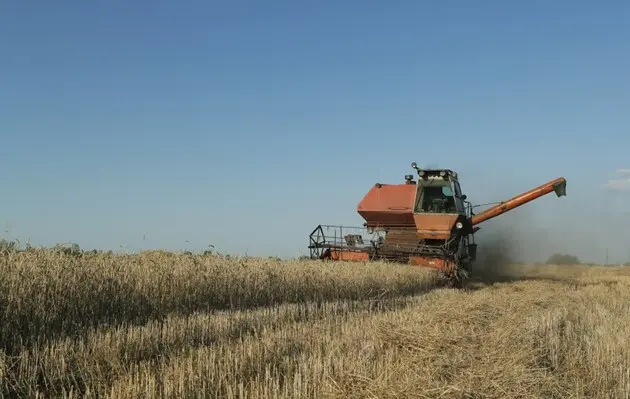If even a white exporter resists civilizational changes, then everything is already hopeless

Unfortunately, so far the current head of the Ministry of Agrarian Policy and Food of Ukraine has not found time to solve both urgent and age-old problems in our agricultural exports. Fortunately, this minister will soon be replaced by his successor. He will inherit a whole bunch of complex issues on the border between state interests and lobbyist resistance. We very much hope that their resolution of issues will not turn into only finding answers to individual petty problems, and the state will eventually start a civilized and constructive dialogue with its main suppliers of currency, namely agricultural exporters.
At first glance, everything is fine with us – in April, the volume of Ukrainian grain exports doubled last year's figure. But in foreign trade, the revival in the inflow of foreign currency does not indicate the solution of all our problems in the monetary sphere of the country. At the end of February, the National Bank of Ukraine (NBU) clarified the current currency restrictions in order to stimulate the return of foreign exchange earnings to Ukraine. The parliament is just now preparing for the second reading of a number of other "incentives" that should guarantee that our grain quantity turns into monetary quality (see draft laws #10168-2 and 10169-2).
The motives are clear – exports are an important source of foreign currency inflows to the country, on which the stability of both the currency market and the exchange rate directly depends. Not to mention income taxes, which Ukraine also does not always receive, no matter how much its foreign trade improves.
Of course, resistance to innovation was expected. Unexpectedly, the loudest voice became the most benevolent market players, who seem to have nothing to worry about.
According to the European Business Association, the business community does not publicly support such control measures for the export of grain and oilseeds, which may appear in national legislation:
- authorizing tax authorities to block exports by blocking export tax invoices in case of suspicion of their falsity;
- prohibition of mixing wheat to achieve other export specifications;
- setting minimum permissible export prices once a month.
There is also the most interesting thing: "Measures for control of supplies, which are carried out by companies with a well-known world name and long experience of work in the Ukrainian market, should be different from the measures applied to companies that can be attributed to a more risky inspection profile." We are told this by people who have been advocating for years the best global practices, the main one of which is equality.
If you take a look at the Top 10 grain exporters (see Fig. 1), two points will be obvious: firstly, all the companies there, if not with a well-known world name, then with long-term work experience, secondly, their share in the total volume reaches 43%, that is, close to half. Unfortunately, it is also not possible to say that this is a problem-free half, because next to outright criminality, we will always find not quite legal schemes, dubious practices, and "windows of opportunity" that the state has opened with its own hands. These changes in control do not solve global problems, but they can really localize the contagion that is rapidly spreading through our foreign trade.
Blocking of exports and tax invoices
Usually, fictitious export refers to the movement across the customs border of only documents about the product, and the product itself does not exist at all. The main purpose of such a procedure is to reimburse value-added tax (VAT) for the "sale of air". I don't even want to suggest that big business is against stopping these frankly "black" practices. So, what is wrong with them?
It turns out that the problem is not so much in export as in invoices. The current system, under which the export of goods does not stop when the invoice is blocked within the country, is satisfactory to exporters. Well, because the buyer loses his tax credit for such a scheme, and not everyone in their "buy-sell-resell" chains counted on that credit at all. Now the blocking of invoices will extend to exports, moreover, it will be prohibited until it is unblocked.
In fact, it makes a lot of sense, given that most export shipments are preceded by a long chain of transactions in the domestic market, involving a wide variety of firms, from decent manufacturers to one-day companies that are the least concerned about any tax credits out there. The fact that the biggest players in the market see this as nothing less than a "collapse" proves that different things are happening in their chains as well.
This does not mean that we have suddenly come to love the tax lock-up system or the principle of "viral culpability" that it cements. But in this case, it, like a litmus test, shows that even a snow-white business has reasons for concern due to the large number of "gray" and "black" players on the market.
Grain mixing
No, this is not about fodder additives to high-quality wheat, it is also about "gray" export schemes. And again, this is a sign that any exporter with a well-known world name and excellent reputation in our market allows himself a little more freedom. Because such an exporter is allowed.
"Mixing" is a scheme in which absolutely real supplies of completely reliable companies appear, but only part of the grain was bought by these companies officially, and part was bought for cash. They mixed, shook, dried and sold. They will return foreign exchange earnings, receive value-added tax (VAT) refunds, pay taxes, but due to mixing, they will be somewhat "optimized" and also "launder" some cash. For themselves or for someone else – it's not so important anymore, the main thing – they play the long game and, as we can see, defend their right to mix, once again proving that even the big players who are leaders in this field do not shy away from dubious practices on our market .
Establishing the minimum allowable export prices
What can we say about the minimum prices – a fuse that we have been waiting for almost since the beginning of independence and which we have been promised since the spring of 2023, when we first noticed that our grain is not the cheapest in the world. In fact, although the pricing problem is obvious, it is still not solved.
In December 2023, corn exported from Ukraine cost mostly USD 140–160/ton, but there were also sales for USD 100–130. and even sales for 90 dollars/ton. The average exchange price of corn at that time was 206.5 dollars/ton. Considering that direct deliveries and contracts are more the exception than the rule for our exporters, they are making quite a good profit from resales all this time.
Let's look at deliveries of Ukrainian corn to China in 2023 – zero direct deliveries, everything goes there through third countries, the lion's share through Switzerland (see Fig. 2). There will be additional profits from resale (often to themselves), and a part of the foreign exchange earnings, and a share of the income tax. And most importantly, it is futile to hope that some invisible hand of the market will change something. The data for January 2024 are the same – there is no direct delivery, Ukrainian corn goes to China from Switzerland, UAE, Bulgaria, Cyprus and other countries.
The situation is similar with supplies of Ukrainian wheat to Egypt or Spain or sunflower oil to China. This is a global problem of our commodity trade. When you read the happy news that Ukraine has increased grain exports to, for example, Pakistan, it is actually news that Switzerland has increased sales of Ukrainian wheat to that country. After all, for example, in February 2024 there was no direct delivery from Ukraine to Pakistan either (see Fig. 3).
Actually, the minimum export price is needed so that the foreign exchange revenue that the exporters actually earned from the sale of our grain, and not the lowest price in a long chain of sales, is returned to the country.
***
The indicated legislative changes will not lead to a collapse, although we will probably hear about it more than once during their consideration in the parliament. Unfortunately, they will not be a fundamental solution to the problem either, because they eliminate the symptoms, not the causes.
To eliminate the causes, we need a high-quality dialogue of the state with the real sector and regulation created not by agrarian federations, confederations and unions, but by the state. Regulation that would primarily take into account the interests of the state budget, the national market and the local producer.
Consider the ten largest exporters: six of them are "daughters" of global companies for which Ukraine is one of the many markets. Three of them "love and appreciate" us so much that they did not go further with statements condemning the aggressor and, on the contrary, are increasing revenue in the Russian Federation. There is no need to idealize, and all the more to sacralize large exporters. It is absolutely normal that their interests do not coincide with those of the state. It is not normal that their interests prevail when making state decisions.
If we ask the question acutely: do exporters want exchange rate stability, reduction of schemes in the sector, competitive environment, civilized rules in work, increase in reliability of the jurisdiction in which they work? Everyone will support these changes.
This is already a good start for a dialogue about why Switzerland is dearer to them than Ukraine, why it is so difficult for them to refuse resale and what they lack in order to establish direct supplies to partner countries. In addition, it is interesting to know what happened so special in the tax administration that cash schemes are returning to the whitest segments of the market?
If we just hear each other, it may happen that local oppression will not be needed, because global regulations will reach another level of civilization.
Moreover, we will not have another vector of changes – European integration is not foreseen. The only question here is whether we will pass it in a civilized manner, gradually and in the course of dialogue, or we will have to go through this vector of changes amid loud scandals, external restrictions and internal currency crises.
Read this article in Ukrainian and russian.
Please select it with the mouse and press Ctrl+Enter or Submit a bug














 Login with Google
Login with Google